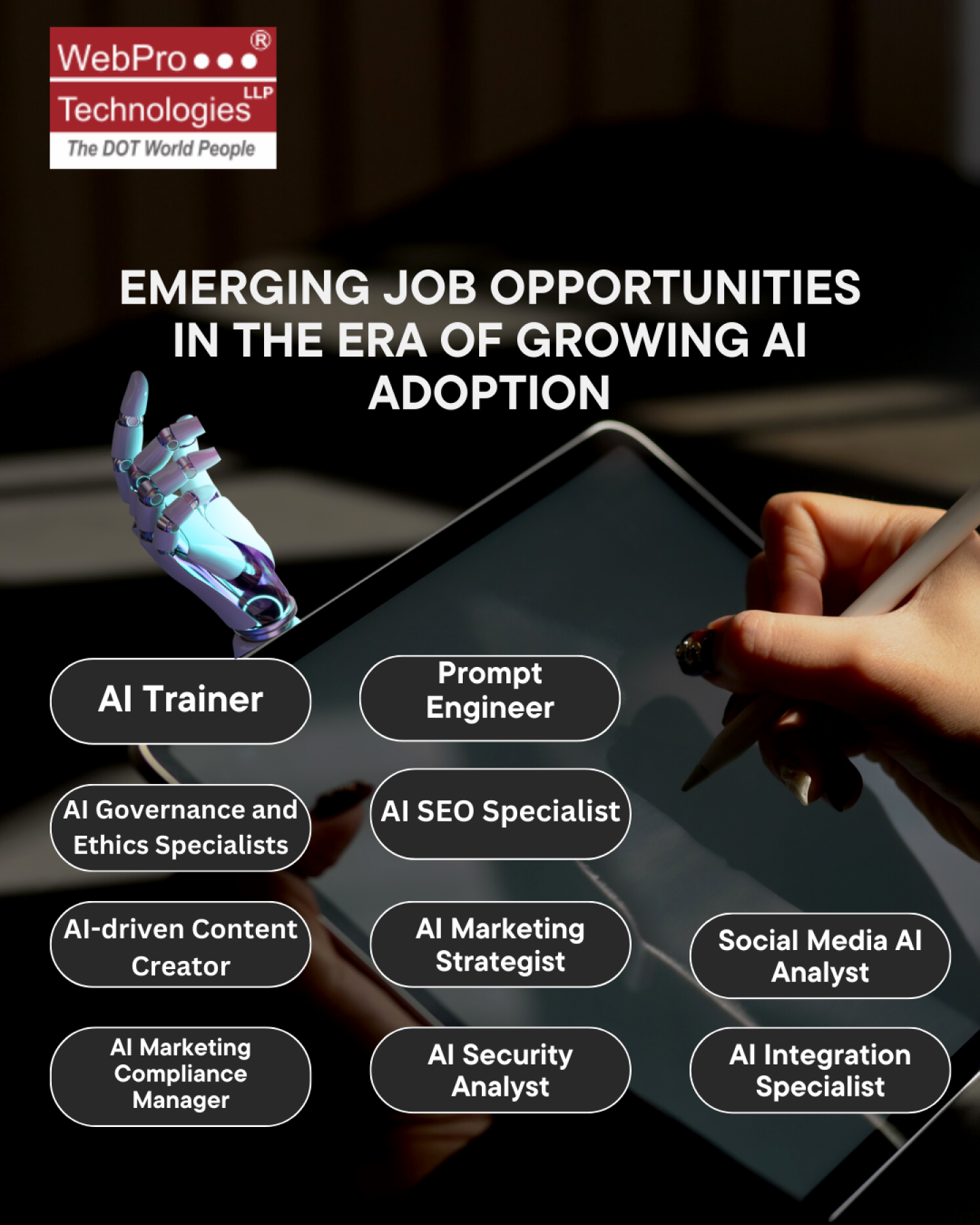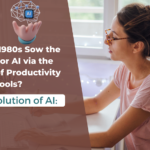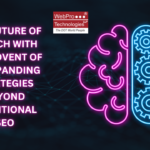As we find ourselves in the final month of 2023, one undeniable trend that has characterized this year is the remarkable surge in the utilization of artificial intelligence (AI). It is very evident that AI has not merely been a passing trend but has, instead, solidified its presence as a transformative force in our lives.
This technological shift is more than just a fleeting development; it is reshaping our very identities and altering the manner in which we connect with and perceive the world around us.
This integration of AI proves that it is not merely a temporary phenomenon but is going to play a pivotal role in shaping our future interactions and experiences.
With any emerging technological trends the first thing to get affected positively or adversely are the job descriptions and job titles. Everyone’s career sooner or later going to depend on how well you can use the AI tools for your efficiency, speed and productivity. The integration of AI into the workplace not only transforms the way tasks are executed but also reshapes the skill set and competencies that are crucial for professional success.
The future of AI in digital marketing is expected to be transformative, bringing about significant changes and opportunities. As AI continues to advance, it is essential for professionals in digital marketing to stay updated on emerging technologies and acquire the necessary skills to adapt to the evolving landscape. Continuous learning and a proactive approach to embracing AI can open up exciting career opportunities in the field of digital marketing.
While I don't have real-time information on specific job titles and descriptions for emerging careers in 2024, I am sharing some general trends and areas where new job opportunities are likely to emerge as a result of advancements in AI and related technologies.
Keeping in mind that the field is rapidly evolving, and the specifics may vary. Here are some trends and potential emerging careers in the intersection of AI and digital marketing:
- Prompt Engineer
- AI Trainer/Teacher
- AI Governance and Ethics Specialists
- AI-driven Content Creator
- AI SEO Specialist
- AI Marketing Compliance Manager
- AI Security Analyst
- AI Marketing Strategist
- Social Media AI Analyst
- AI Integration Specialist
Let’s explore and seek to uncover and comprehend the dynamic shifts in the professional sphere, highlighting the emerging avenues that hold significant potential for individuals seeking new and promising career paths.
- Prompt Engineer
Well-crafted prompts play a pivotal role in enabling the AI model to grasp the user's intention and context, ultimately resulting in responses that are both accurate and pertinent.
A prompt is a text that goes into the AI tool - Language Model (LM), and prompt engineering is the art of designing that text to derive the desired output. It involves tailoring input that is clear and concise, which helps AI-powered tools understand the user’s intent. Hence, to effectively use this process, it is essential to ensure that AI-powered tools don’t generate nonsensical, inappropriate responses.
Hence, the efficiency of the AI tool in use depends on how good you are in the way you prompt the AI. As the AI model may have all the answers but it can give you the best and the most relevant answer only if your prompt is framed the correct way.
Read more about prompt engineering on : https://www.techtarget.com/searchenterpriseai/definition/AI-prompt-engineer
- AI Trainer/Teacher
The AI trainer plays a key role in ensuring that AI functions at its best and provides a rewarding user experience. The AI trainer trains AI systems by creating datasets, defining algorithms, and optimizing models. This role involves understanding the nuances of human behavior to improve AI performance and user experience.
At the core of an AI Trainer’s role is the task of teaching chatbots how to think and interact. This isn’t as simple as just feeding data into a system. Yes, data is crucial, but the real skill lies in carefully curating and shaping that data to train the AI effectively. It’s about understanding the subtleties of human conversation and teaching a chatbot to do the same. This is what transforms a complex piece of code into a friendly, helpful assistant that can answer questions with ease.
Read More on : https://boost.ai/blog/ai-trainer-a-job-of-the-future/
- AI Governance and Ethics Specialists
The role of chief AI ethics officer (CAIEO) is on the rise at leading enterprises as digital transformation becomes more complex and AI adoption grows rapidly across industries.
Forward-looking companies are turning to the CAIEO role to put into operation corporate values related to AI across the organization's divisions.
CAIEOs need to ensure that the AI technology being developed, used and deployed is trustworthy; and that developers have the right tools, education, and training to easily embed these properties in what they produce.
CAIEOs should have multi-disciplinary knowledge of AI techniques, tools and platforms, AI risks and its impact on society, business strategy, industries and public policies, as well as good communication skills.
Simply put, the job involves ensuring the responsible and ethical development and deployment of AI technologies. This role involves creating guidelines and policies to address ethical concerns related to AI, such as bias, privacy, and transparency.
Read more on: https://www.weforum.org/agenda/2021/09/artificial-intelligence-ethics-new-jobs/
- AI-driven Content Creator
Creating compelling content involves several key elements, including topic selection, drafting, organization under sub-headings, proofreading, and tailoring language to specific geographic locations.
Each of these steps demands careful attention and considerable time investment. Moreover, staying updated with research, statistics, and opinions from thought leaders in the industry adds an additional layer of complexity.
As the content creator, one is responsible for creating, reviewing and editing content for the company which will be published in the company's websites and social media pages. You will also be responsible for researching on the key SEO terms and implementing them in the content to gain maximum exposure.
Developing content strategies that integrate AI-generated content. This involves using natural language processing (NLP) and content generation tools to create engaging and relevant content for digital marketing channels.
Read More on: https://www.webpro.in/ai-unleashed-navigating-the-future-of-seo-content-creation-with-chatgpt/
- AI SEO Specialist
Every SEO know the importance of keeping abreast with the latest algorithm updates and how they affect the search results. An AI SEO Specialist has to add another dimension and also know how the search engines are incorporating AI in the search algorithms.
Just came across a job description for AI SEO Specialist on: https://www.naukri.com/job-listings-b2b-ai-seo-specialist-dg7-mumbai-3-to-8-years-260823501467
It goes as follows:
Job description
The AI SEO Specialist will be responsible for developing and implementing AI-powered SEO strategies to improve the organic search visibility and ranking of our website. This role will require a deep understanding of SEO principles and practices, as well as the ability to use AI tools and techniques to automate and scale SEO tasks.
Key Responsibilities :
The ideal candidate for the B2B AI SEO Specialist role should possess the following skill set:
- Machine Learning Algorithms: Proficiency in understanding and applying various machine learning algorithms, such as regression, clustering, classification, and recommendation systems, to enhance SEO strategies.
- AI-Enhanced Content Creation: Experience with AI-powered content generation tools that can assist in creating high-quality, relevant, and optimized content for improved search rankings.
- Predictive Analytics: Ability to leverage predictive analytics models to anticipate changes in search engine algorithms and user behavior, allowing for proactive adjustments to SEO strategies.
- Image and Video SEO: Familiarity with AI techniques for optimizing images and videos, including image recognition, alt text optimization, and video transcription, to improve multimedia search visibility.
- Voice Search Optimization: Understanding of AI-driven voice search technology and its implications for SEO, including optimizing for voice-based queries and featured snippets.
- Natural Language Generation (NLG): Proficiency in NLG tools to create AI-generated content that resonates with both search engines and human readers, maintaining a natural tone and relevance.
- A/B Testing with AI: Experience in conducting A/B tests using AI-powered tools to compare different SEO strategies and identify the most effective ones based on real-time data.
- Chatbots and Virtual Assistants: Knowledge of AI-powered chatbots and virtual assistants and their role in enhancing user engagement, answering queries, and improving overall website experience.
- Data Visualization and Reporting: Skill in using AI-driven data visualization tools to present complex SEO insights in a clear and visually appealing manner to stakeholders.
- Sustainable AI Strategy: Ability to implement AI SEO strategies that align with long-term sustainability and ethical considerations, ensuring compliance with search engine guidelines.
- Semantic Search Optimization: Understanding of semantic search concepts and utilizing AI to improve content s semantic relevance and context for search engines.
- Local SEO with AI: Familiarity with AI applications for local search optimization, including geo-tagging, local intent optimization, and enhancing local business listings.
- Algorithmic Penalty Recovery: Experience in using AI-driven data analysis to identify and recover from algorithmic penalties, and adapting strategies to maintain compliance.
- AI-driven Link Building: Knowledge of AI tools that can assist in identifying authoritative and relevant link-building opportunities, enhancing the website s backlink profile.
- Social Media AI Integration: Ability to integrate AI-enhanced content into social media strategies for cross-channel optimization and improved audience engagement.
- Continuous Learning: Enthusiasm for staying updated with the latest advancements in both AI and SEO fields, attending conferences, webinars, and online courses as necessary.
- AI-Driven Strategy: Develop and execute innovative SEO strategies that incorporate AI and machine learning techniques to optimize website content, structure, and user experience.
- Keyword Research: Utilize AI tools to identify relevant keywords and search trends, and integrate them strategically into website content for improved organic search rankings.
- Content Optimization: Collaborate with content creators to implement AI-driven content recommendations, including keyword integration, semantic analysis, and topic relevance.
- Technical SEO: Work closely with developers to ensure proper implementation of technical SEO aspects, such as site speed optimization, mobile responsiveness, schema markup, and AI-generated metadata.
- Data Analysis: Leverage AI-powered analytics tools to monitor and analyze website performance, organic traffic trends, and user behavior, providing actionable insights for continuous improvement.
- Competitor Analysis: Utilize AI tools to analyze competitors SEO strategies, identifying opportunities for differentiation and improvement.
- Algorithm Updates: Stay up-to-date with search engine algorithm changes and trends in AI and machine learning in the SEO landscape, adapting strategies as needed.
- Natural Language Processing (NLP): Apply NLP techniques to enhance on-page SEO elements, including meta descriptions, headers, and other content components.
- Collaboration: Work cross-functionally with content creators, developers, designers, and other teams to implement AI SEO strategies effectively.
By possessing these additional AI-driven skills, the AI SEO Specialist will be well-equipped to navigate the ever-evolving landscape of search engine optimization, leveraging artificial intelligence to stay ahead of the curve and deliver exceptional results.
Skills:
- Bachelor s degree in Marketing, Computer Science, Data Science, or a related field. Master s degree preferred.
- Proven experience (3+ years) in SEO, with a focus on AI and machine learning integration.
- Proficiency in using AI tools and platforms for SEO, such as AI-generated content tools, NLP libraries, and predictive analytics tools.
- Strong understanding of search engine algorithms, ranking factors, and SEO best practices.
- Familiarity with programming languages like Python, as well as AI frameworks and libraries.
- Excellent analytical skills and the ability to interpret data trends and user behavior.
- Up-to-date knowledge of industry trends and algorithm updates.
- Outstanding communication and collaboration skills.
- Certifications in AI, machine learning, and SEO are a plus.
Reading the above description I am sure everyone is convinced that SEO is not only more technical today but requires experience, expertise and specific skill to do justice to the job.
- AI Marketing Compliance Manager
The main task of an AI Marketing Compliance Manager is to ensuring that AI-driven marketing strategies comply with legal and ethical standards. This role involves staying updated on privacy regulations, data protection laws, and industry guidelines to mitigate risks associated with AI in marketing.
The larger perspective of AI compliance is also to assure that AI-powered systems are employed responsibly and in a way that benefits society.
Not being able to use AI in a way that is fully compliant with the applicable law may result in high fines and penalties.
To ensure full AI compliance, organizations should take into account the following best practices:
- Establish clear policies and procedures for AI use.
- Develop a comprehensive compliance program.
- Monitor AI systems for compliance with applicable laws and regulations.
- Create an AI governance framework.
- Ensure data privacy and security.
- Establish an audit process for AI systems.
- Develop a process for reporting and responding to compliance issues.
- Implement a risk management program.
- Train personnel on AI compliance requirements.
- Utilize automated tools to monitor AI compliance.
Read more on: https://www.exin.com/article/ai-compliance-what-it-is-and-why-you-should-care/
- AI Security Analyst
This job involves Protecting AI systems from cyber threats and ensuring the security of data used in AI models. This role involves staying updated on the latest cybersecurity trends and developing strategies to mitigate risks
To understand better, read the job description here: https://www.ziprecruiter.in/jobs/289817241-ai-cyber-security-penetration-testing-specialist-at-sap-successfactors
- AI Marketing Strategist
This position entails the creation and implementation of AI-driven marketing strategies. It involves harnessing AI algorithms to scrutinize market trends, consumer behavior, and competitor strategies, with the aim of optimizing marketing campaigns for maximum impact.
AI marketing strategy integrates artificial intelligence technologies and methodologies to refine and elevate marketing endeavors. It entails employing AI to analyze customer data, streamline processes, tailor experiences, and enhance decision-making, ultimately fostering improved marketing outcomes.
The role of an AI Marketing Strategist encompasses the development and execution of marketing strategies heavily reliant on AI technologies. These professionals bear the responsibility of identifying opportunities where AI can augment marketing efforts, such as optimizing ad campaigns and automating customer segmentation.
AI plays a pivotal role by conducting predictive analytics on customer data, swiftly analyzing vast datasets using efficient machine learning (ML) algorithms. It not only generates insights about future customer behavior but also recommends more personalized content and identifies patterns within extensive datasets for marketers to act upon.
AI Marketing Strategists serve as a bridge between technology and marketing, contributing to the realization of superior results. Their expertise lies in seamlessly integrating advanced technology into marketing initiatives to drive enhanced performance and outcomes.
Content on https://www.salesforce.com/ap/resources/guides/role-of-ai-in-marketing/ can be helpful reading on this topic.
- Social Media AI Analyst
A Social Media Analyst is a professional who specializes in analyzing and interpreting data from various social media platforms to provide valuable insights and recommendations for businesses or individuals. The role involves monitoring social media channels, collecting data, and using analytics tools to understand the performance of social media campaigns, audience engagement, and overall social media presence.
Some of the tasks that a Social Media AI Analyst is responsible for:
- Integrating artificial intelligence tools and technologies into social media analysis processes to enhance efficiency, automate tasks, and derive deeper insights.
- Leveraging AI algorithms for advanced data analytics to analyze large volumes of social media data. This could include sentiment analysis, trend prediction, and pattern recognition to extract meaningful insights.
- Developing and implementing systems that use AI to automate the process of generating social media analysis reports. This can save time and ensure real-time or near-real-time reporting.
- Applying predictive analytics powered by AI to forecast the success of social media campaigns. This could involve predicting engagement rates, click-through rates, and other key metrics before launching a campaign.
- Utilizing AI algorithms for more sophisticated audience segmentation on social media platforms. This involves identifying and categorizing users based on their behavior, preferences, and demographics.
- Overseeing the performance and impact of content generated by AI, such as automated posts, comments, or responses. Ensuring that AI-generated content aligns with brand guidelines and resonates with the target audience.
Read more on: https://www.marketingaiinstitute.com/blog/what-is-artificial-intelligence-for-social-media
10. AI Integration Specialist
In this role, you will be responsible for the integration of AI technology across the entire organization and the maintenance of AI and new technologies to support the organization's efforts to stay at the forefront of the advertising industry.
The responsibilities can be listed as follows:
- Develop and implement a comprehensive AI integration plan across all departments of the agency, including web & graphics, video production, photography, and digital.
- Research and evaluate new AI tools and technologies that could support the specific use cases in each department.
- Test and evaluate AI tools in their intended use cases to ensure that they can effectively support the department's workflow.
- Create process documentation and training resources for the use of AI tools across the organization.
- Train employees on the use of AI tools and process documentation to ensure their effective integration into daily workflows.
- Monitor and evaluate the impact of AI on the specified use cases in each department to identify areas for improvement.
- Keep abreast of new developments in AI technology and recommend updates and improvements as necessary.
- Collaborate with the management team to develop and implement strategies to leverage AI technology to improve performance, reduce costs and increase efficiency.
- Create an “Evidence of Improvement” by project type, department, and use case to track benefits of AI implementation.
- Troubleshoot and debug AI systems and resolve any integration issues
- Continuously monitor the performance of AI-powered systems, looking for ways to optimize and improve them.
- Implement automation between tools and applied technologies.
- Act as a liaison between the technical and non-technical teams, helping to communicate AI needs, plans and developments.
As you can see that the emerging job opportunities and the evolving job landscape due to the increasing use of the AI tools is not only promising but interesting too.
Implementation of AI is not taking jobs away, it is only eliminating routine and repetitive tasks, making way for more stimulating and complex responsibilities.












